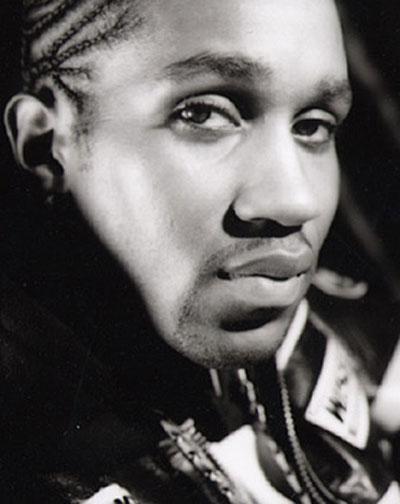Caushun looks like a thug. He’s got the jewelry. He’s got the corn-rowed hair. He’s got the ghetto fabulous fashion sense: baggy pants, bandannas and Timberland boots. He even was raised in the same rough New York City neighborhood as the Notorious B.I.G. But there is one subtle difference about Caushun. He’s gay.
Caushun is a 25-year-old gay rapper from the Bedford-Stuyvesant neighborhood in Brooklyn, and through his open sexuality he hopes to “keep it real” in the most honest way.
“I feel like a lot of artists lose their credibility when they don’t come out honestly with the way they are,” Caushun told Newsweek. “This is the era of realism. Every hip-hop artist is like, ‘Oh, keep it real, keep it real.’ And what I’m doing is true. I’m definitely keeping it real because I’m not straight, so I can’t keep it real by trying to act straight and play straight.”
The rapper told The New York Times he wants to be “hip-hop’s homosexual Jackie Robinson.” But as white major leaguers were closed to Robinson being in baseball, so is the mainstream to gays in hip-hop. According to listeners, if Caushun breached the walls of the rap conventional, it could have a deafening impact on how gay culture is perceived in entertainment — and even in America.
“It’s like Eminem,” said Carlton Allen, an agriculture business senior. “He had a hard time getting respect because he was white. He was talented, and he stayed in your face, and that’s when the black community began to respect him. If a million people buy his record, then he’ll stay in everyone’s face. If he’s good than that other aspect about him will make him unique. It’ll put him on his own plateau.”
Listening to audio samples on Caushun’s Web site, www.thegayrapper.com, it is apparent amid his gay intonation and his taboo lyricism that he is ready for the big leagues and his recent signature to Baby Phat Records may be the first step.
His debut album, “Shock and Awe,” will be released at the end of June, in time for Gay Pride Day. His association with Baby Phat Records, which is run by rap mogul Russell Simmons’ wife Kimora Lee Simmons, may only further his career.
“Rap music is one of the most homophobic musics we know,” Simmons told the New York Times. “But, he’s dope and he’s unique because of his perspective on the world. I can’t imagine that people aren’t going to buy it.”
However, Leonard Moore, an associate professor of history and director of African and African-American studies at LSU, does not share the same sentiment.
Moore, who teaches a hip-hop culture class, says the majority of the hip-hop contingency will not listen to Caushun, because of the current state of hip-hop.
“Much of hip-hop now is being macho,” Moore said. “How hard you can be, I’m a real nigga and all this other stuff. This guy, who comes out openly gay? He doesn’t have a chance.”
Even though blacks were discriminated against throughout history, Moore does not believe the black community will be sensitive to this issue because even though blacks are traditionally liberal when it comes to politics, on social issues blacks are conservative.
“I think the black community will be even less tolerant because of the affiliation with the black church,” Moore said. “The bible does not condone homosexuality. The bible speaks of it being sinful.”
When reminded of the persecution blacks faced during the civil rights movement, Moore said there was a difference between the civil rights movement and gay rights movement.
Black were “persecuted for something they had no control over — the color of their skin,” Moore said. “Most folks feel homosexuality is a lifestyle. It’s a choice.”
Many students like Jason Avant, a biological sciences senior, have no problem with gay culture seeping into the mainstream, because a person’s sexual orientation shouldn’t determine whether music is good or bad.
“There is a place for all genres in music,” he said. “If there’s an audience, then there is a place for it. I listen to hip-hop, and I feel that music isn’t designed for one set of people. Music expresses emotion, and it’s universal.”
D.J. McConnell, a psychology freshman, seems to agree. Even though he is not a big hip-hop music fan, he doesn’t think it matters what the source of the music is, just as long as it’s good.
“I really don’t think it matters,” he said. “I don’t think it would make a difference. I mean music is music. I don’t categorize. There’s good music and bad music. As long as it’s good then it doesn’t matter where it comes from.”
On the flip side, Crystal Lane, an elementary education freshman, doesn’t think there is any room for a gay rapper in hip-hop, because of the current thug image many artists portray. She thinks a gay rap artist would have to have really good word flow to make it big.
“If you’re gay, that’s cool,” she said. “Just don’t come with the fruity thing.”
Of course, there have been many popular gay entertainers, from Elton John and R.E.M.’s Michael Stipe to Rosie O’Donnell and K.D. Lang, but hip-hop never has had a mainstream successful rapper who was also gay.
However, Moore said he thinks hip-hop is not ready for gay culture “because modern society is not ready for it.”
Proceed with ‘Caushun’: gay rapper enters scene
April 24, 2003

Proceed with ‘Caushun’





